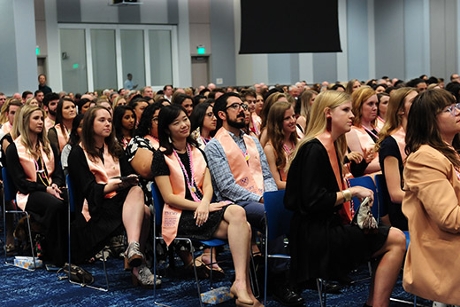Last Fall, 16 students became the first cohort to graduate from the Nell Hodgson Woodruff School of Nursing’s Distance Accelerated BSN (D-ABSN) program. The graduating class is now the first group of degree-seeking students to pursue and secure their Bachelor of Science in Nursing (BSN) degree without ever studying in an Emory classroom on campus.
Created to increase access to second-degree students, the D-ABSN program is a full-time, distance-based program that allows students with a bachelor’s degree to earn a BSN in just three semesters of study. Far from a standard, self-paced online program, students engage individually and with classmates daily through an online, inquiry-guided learning environment and complete their clinical training rotations through local placements arranged by the D-ABSN program.
“We believe that our model, while still being refined, presents the opportunity for our school to deliver excellence in care across the United States and expand the Emory brand to markets far beyond Atlanta,” says Dr. Angela Haynes-Ferere, DNP, FNP-BC, MPH, director of the D-ABSN program. “Keeping with our mission, it enables Emory to prepare visionary nurse leaders to positively impact healthcare in a changing environment—all over the country, and perhaps around the world.”
Following completion of the program, all students in the first cohort completed The National Council Licensure Examination (NCLEX), with 94% of the students passing on first attempt. This success rate exceeds the requirements for Georgia Board of Nursing’s (GBON) first cycle NCLEX testing and allows this program to continue striving toward improvement.
The graduating class experienced first-hand the global impact of healthcare through a trip to Haiti where students delivered care to medically fragile children in an orphanage. Students cited their experience in Haiti as not only educational but life-changing, and the most memorable part of their education.
“When there is nothing available, the most basic health services take on increased importance and sometimes may provide life-changing experience for both the caregiver and the patient,” says Haynes-Ferere. “That was a transformative insight for our students, and the fact that much of our interaction was with infants and children in an orphanage simply made the experience that much more unforgettable for our students.”
Following the success of the first graduating class, the D-ABSN program expects 20 to 30 students per cohort with three cohorts starting annually in January, May and September.
Created to increase access to second-degree students, the D-ABSN program is a full-time, distance-based program that allows students with a bachelor’s degree to earn a BSN in just three semesters of study. Far from a standard, self-paced online program, students engage individually and with classmates daily through an online, inquiry-guided learning environment and complete their clinical training rotations through local placements arranged by the D-ABSN program.
“We believe that our model, while still being refined, presents the opportunity for our school to deliver excellence in care across the United States and expand the Emory brand to markets far beyond Atlanta,” says Dr. Angela Haynes-Ferere, DNP, FNP-BC, MPH, director of the D-ABSN program. “Keeping with our mission, it enables Emory to prepare visionary nurse leaders to positively impact healthcare in a changing environment—all over the country, and perhaps around the world.”
Following completion of the program, all students in the first cohort completed The National Council Licensure Examination (NCLEX), with 94% of the students passing on first attempt. This success rate exceeds the requirements for Georgia Board of Nursing’s (GBON) first cycle NCLEX testing and allows this program to continue striving toward improvement.
The graduating class experienced first-hand the global impact of healthcare through a trip to Haiti where students delivered care to medically fragile children in an orphanage. Students cited their experience in Haiti as not only educational but life-changing, and the most memorable part of their education.
“When there is nothing available, the most basic health services take on increased importance and sometimes may provide life-changing experience for both the caregiver and the patient,” says Haynes-Ferere. “That was a transformative insight for our students, and the fact that much of our interaction was with infants and children in an orphanage simply made the experience that much more unforgettable for our students.”
Following the success of the first graduating class, the D-ABSN program expects 20 to 30 students per cohort with three cohorts starting annually in January, May and September.

